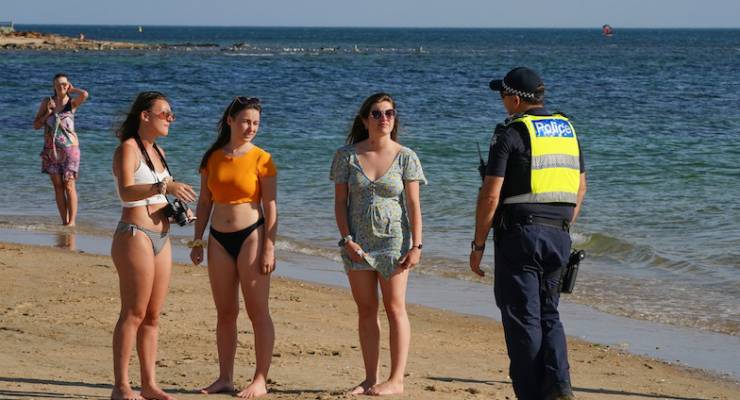
Almost as one, traditional media, boomer social media and state and federal politicians have come together to wag their collective finger of blame for Australia’s COVID-19 crisis at the designated villain: millennials.
They’re “negligent”, says the PM. “Selfish”, say various state premiers.
By the weekend, The Sydney Morning Herald stopped pussy-footing around, instead blurting out its front page “exclusive”: “The kids are not all right”. Inside, the spill was headed: “Fines warning as young ignore social isolation”.

The headings captured the tut-tutting zeitgeist, although both went a fair bit further than the NSW Police Minister, David Elliott, who the story relied on to stand up its lecture. Elliott was talking specifically about a particularly despised millennial subset: backpackers.
There’s an unfairness in this attack that goes beyond the usual grumpy old folks’ fact-free harrumphing about “young people today”. It ignores the risk-sacrifice disparity in the current emergency.
Millennials and Gen Z are being asked to bear the bulk of the sacrifice involved in a rolling shutdown — through loss of hospitality and retail jobs, effective suspension of schools and universities, and winding back of social gatherings. While not immune, they are also least at risk of serious illness.
It’s understandable that the SMH is feeding its own ageing audience. But the masthead is not alone. Those brave enough to spend time browsing Boomer Twitter will find millennial bashing hurrying itself on from genuine concern about social distance into priggish puritanism.
Australia’s proud hedonistic embrace of beach culture has become a particular focus of attack, morphing from (often misplaced) claims of breaches of social distancing to a more pious carping of those people enjoying themselves in *gasp* the outdoors.
Photos taken with telephoto lenses, which misleadingly compress distance, are circulating on social media. Take the AAP photo captioned as a “crowded” Cronulla promenade. As explained here by Stligherrian it indicates no such thing.
The media carry-on about the now abandoned restrictions on haircuts was, in part, fed by a sense that hairdressing (and certainly hairdressing that took more than half an hour) seemed unacceptably self-indulgent.
This grumpiness could be waived off as just another rhetorical turn in the ongoing inter-generational conflict that determined the 2019 election and continues to shape the government’s climate (in)action. But it’s being used as part of the drive to criminalise (and, since last week, militarise) social behaviour. It’s a default setting in Australian politics: bans, fines and jail as social messaging.
Most states have now handed their police the power to issue on-the-spot fines of thousands of dollars for breaching social distancing. The decision by the federal government to add the military in to the mix brings a concerning dimension to what remains, at heart, a health emergency.
There’s some early evidence that, as ever, that power will be abused (although, in NSW at least, the police rhetoric got notably less hairy-chested over the weekend).
And, let’s be honest: Australians can be narks. We like to think we’re the cultural descendants of larrikin convict rebels but, at times like this, we’re truer to the traditions of the jailers. As 7News breathlessly reported, beneath the now obligatory photo of millennials lazing on the beach: “Hundreds of concerned people have been dobbing in their neighbours for flouting coronavirus restrictions, with NSW Police receiving about 600 calls in just two days”.
Dob-in calls are used far more to settle scores than to reduce wrongdoing. They’re a make-work scheme for neighbourhood scolds that rarely result in prosecution.
And from the shaming on the front page through to the impact of the economic crisis, it’s likely to be those lazy millennials who will bear the brunt.








“… pious carping of those people enjoying themselves in *gasp* the outdoors.” Well, of course. We let the nonsense of second hand cigarette smoke in the Great Outdoors go through to the keeper, too, so it was inevitable we’d have the same carping about Covid19.
Former Isr-eli Health Minister, Professor Yoram Lass, says that the new coronavirus is „less dangerous than the flu“ and lockdown measures „will kill more people than the virus“. He adds that „the numbers do not match the panic“ and „psychology is prevailing over science“. He also notes that „Italy is known for its enormous morbidity in respiratory problems, more than three times any other European country.“
NSA whistleblower Edward Snowden warns that governments are using the current situation to expand the surveillance state and restrict fundamental rights. The control measures currently put in place would not be dismantled after the crisis.
Are you THAT Jones ?….And are you no. 1, 2, 3 or 4 of the wrestling tag team that’s just jumped on Crikey ?
I really just read this of the Covid-19 story needing a good villain. The virus is too abstract to demonise, so it’s easier to point at young people as the problem. Needless to say there are plenty of people of all age groups being dickheads, but we’re not going to hear too much about them.
I really just read this of the Covid-19 story needing a good villain. The virus is too abstract to demonise, so it’s easier to point at young people as the problem. Needless to say there are plenty of people of all age groups being dickheads, but we’re not going to hear too much about them.
But haven’t the biggest transmitters of the disease in Australia been the more elderly cruise ship passengers? As someone smarter than me commented a few days ago in Crikey – what an irony that the self-funded good bourgeoise burghers that have voted for Morrison and Dutton to keep us safe from those filthy refugees now turn out to be the biggest threat to our national well-being and security.